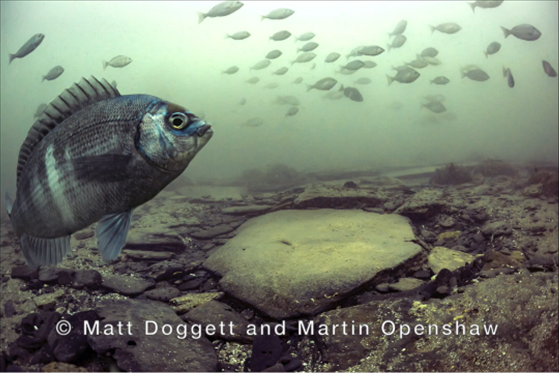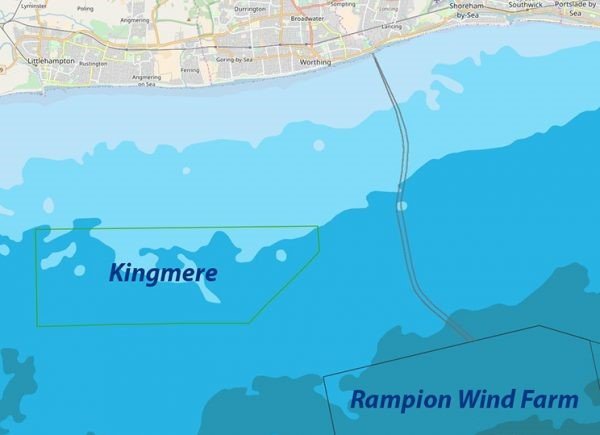
Fish INTEL: June 2022 update
It's been a busy few months for our Fish INTEL team, featuring a new species addition, a partner meet-up, testing listening devices, and gaining insights from local fishers.
A new addition
The black seabream (Spondyliosoma cantharu)
We have a new (species) addition to the project – the black seabream. This prized angling fish visits the inshore UK coast between Dorset and Kent during the spring and summer months. It's best known for its characteristic breeding behaviour.
The males make a large nest up to 12 feet in diameter, attracting a female to lay eggs on the exposed rocky seabed. He then fertilises and guards the eggs from predators until hatching, chasing away any rogue males of the same species.

Credit: Matt Doggett
The project will also allow us to better understand survivorship and the health of adults being removed from the sea.
The fish in the Kingmere MCZ may be vulnerable to dredging for aggregate material. Our findings can help to ensure that such activities only happen after the nests have been vacated by the young and defensive adult males.
Other black seabream have been tagged in a nearshore area closed to trawling, funded by the Pebble Trust with Sussex Wildlife Trust.
All tagging work in Sussex is in collaboration with Sussex IFCA and RS Aqua, and supported by local anglers who donated some of their fish to be tagged.

Kingmere MCZ off the coast of Worthing
Credit: Matt Doggett
Brest meeting
We also discussed how we're communicating the project with anglers and commercial fishers. The Marine Conservation Society interviewed a large number of participants involved in the project.
Progess in windfarms
France Nature Environment: Installation of listening devices
Our partners in windfarms in Brittany and Normandy: France Energy Marine, have started to test their listening devices in their windfarms.
16 devices have been placed in the Saint Brieuc Marine Park Area windfarm, which will be used to listen to bass and other species that have been tagged in both UK and French waters.

Credit: France Energies Marines
Talking to people who catch the fish!
Our partners at the University of Brest have been pretty busy talking to fishers of Mer D’Iroise, Saint-Brieuc and Seine Bay.
Fishers have offered the project ideas for the best areas to deploy listening devices in our three French project areas. They've also helped scientists by providing local knowledge on currents, habitats, seabed features – all useful when considering where best to track fish.
Interviews with fishers – particularly artisanal, small-scale fishers – have unfortunately identified a decline in pollock (Pollachius pollachius) in Brittany waters. This is thought to be due to a number of factors, such as large recreational catches and use of large seabed seine nets.
By contrast, fishers are seeing a rise in the number and catches of crawfish.

Crawfish
Credit: Thomas Stamp, University of Plymouth
Other news
49 European bass were tagged earlier this year in Devon, as part of a gillnet bycatch study in collaboration with Devon and Severn IFCA. Excitingly, these fish have already been recorded making substantial movements, with one individual detected by Fish INTEL partners, University of Exeter, approximately 6 km off Dodman point near Falmouth - representing a movement of around 80 km.
The team then turned their attention to pollock in early Spring, and managed to tag 10 individuals - the first of this species to be tagged with acoustic transmitters in UK waters.
A busy summer now beckons, featuring more tagging of bass, pollock and bream, as well as trips to the Isles of Scilly to download data on crawfish movements gathered over the past year.
Research papers
We've recently published two papers related to Fish INTEL:
One on Crawfish migrations and population modelling: This tracked the recovery of the Crawfish (Panilurus elephas) recovery from Seasearch dive reports. The data from divers was extrapolated across similar habitats elsewhere to assess population trends throughout suitable habitat over the past two decades.
One on seabed habitat recovery after the halting of bottom towed fishing gears in southwest reefs: This collaborative research by University of Exeter and Cornwall Inshore Fisheries and Conservation Authority showed that sediments freed from bottom trawls benefitted upright seabed life – habitats that suit greater populations of fish from other study sites (such as Lyme Bay).
What’s next?
Many of the projects are now every 3 months and involve going to sea to download the data from the receivers, so we’ll have more news of migrations in the next update!
Fish INTEL is led by the University of Plymouth and funded by the Interreg Channel and European Regional Development Fund. Acoustic tagging in Sussex is supported by FISH INTEL, Sussex Wildlife Trust, Pebble Trust, Sussex IFCA, Natural England and RS Aqua.



